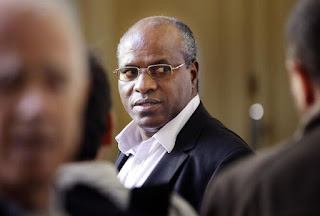Guinea's Junta Seizes Government Officials' Passports and Freezes Bank Accounts
Guinea's Military Junta Tightens Grip:
In a bold move echoing the iron grip of the ruling military junta, Guinea's government officials find themselves stripped of their passports and frozen bank accounts. This dramatic action follows the mysterious dissolution of the administration, leaving citizens and international observers alike perplexed.
Since their seizure of power through a coup in September 2021, the military leadership has consistently flexed its muscles, solidifying control with each decree. The latest announcement, made on Monday, marks the dissolution of the sitting government, which had been in power since July 2022.
General Ibrahima Sory Bangoura, standing before state television cameras flanked by a formidable group of soldiers, delivered the directives with an air of authority. The junta's orders include the freezing of bank accounts belonging to government officials, the confiscation of their travel documents, and the stripping of privileges such as service vehicles, bodyguards, and assistants.
Curiously, the junta has chosen to remain silent regarding the motivations behind these drastic measures. However, amidst the silence, one recurring theme emerges – a commitment to combatting corruption, a rallying cry often associated with military takeovers across West Africa.
The state broadcaster, RTG, further propagated the image of junta leader Colonel Mamady Doumbouya as a resolute leader navigating through "moments of adversity." Yet, the tribute lacks substance, leaving observers to ponder the true intentions behind the junta's actions.
Reports suggest mounting tensions within the government ranks, culminating in a rare protest in the capital city, Conakry, earlier this month. The junta's response has been swift and harsh, with the prohibition of all demonstrations and the detention of opposition figures, civil society activists, and journalists. Additionally, internet access has been severely restricted, amplifying concerns over human rights violations.
Under international pressure, Colonel Doumbouya has made promises of returning the government to civilian control by the end of 2024. This transitional period, as argued by the military, is deemed necessary to implement sweeping reforms in Guinea, a nation rich in resources yet grappling with economic challenges.
As Guinea navigates through this tumultuous period, the eyes of the world remain fixed on the unfolding developments, apprehensive of what the future holds for the West African nation.

























.jpg)